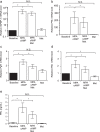Metformin attenuates the production and proliferative effects of prolactin induced by medroxyprogesterone acetate during fertility-sparing treatment for endometrial cancer
- PMID: 35820883
- PMCID: PMC9277913
- DOI: 10.1186/s12885-022-09858-w
Metformin attenuates the production and proliferative effects of prolactin induced by medroxyprogesterone acetate during fertility-sparing treatment for endometrial cancer
Abstract
Background: Progestin is used for fertility-sparing treatment in cases of endometrial cancer (EC). Progestin can induce hyperprolactinemia by increasing pituitary secretion and endometrial decidualization. However, progestin induces prolactin (PRL) secretion, which stimulates cell proliferation and deleteriously affects treatment. To date, the detrimental effect of PRL, the secretion of which is induced by medroxyprogesterone acetate (MPA) during fertility-sparing treatment, has not yet been fully elucidated. Therefore, we aimed to assess the effects of PRL on EC cells during combined treatment with progestin and metformin.
Methods: In total, 71 patients with EC/endometrial atypical hyperplasia who underwent fertility-sparing treatment at our institution from 2009-2019 were enrolled. Serum PRL levels were determined using enzyme immunoassays; mRNA levels in endometrial tissues were determined using quantitative reverse-transcription PCR. To evaluate MPA-induced decidualization, cancer-associated stromal cells were enzymatically released from surgically removed specimens of six patients with EC. To examine PRL-induced cell proliferation, the EC cell lines Ishikawa, HEC1B, and HEC265 were used. In vitro cell proliferation was evaluated using the WST assay; protein levels of signaling molecules were determined using western blotting.
Results: MPA administration significantly increased serum PRL levels at 3 and 6 months and upregulated IGFBP-1 and PRL mRNA expression in tissues at 3 months of fertility-sparing treatment. Metformin significantly reduced MPA-induced IGFBP-1 and PRL mRNA expression during fertility-sparing treatment and significantly inhibited the upregulation of IGFBP-1 and PRL mRNA and PRL levels due to decidualization induced by MPA and cAMP treatment in primary cultured EC stromal cells. In vitro, PRL increased cell proliferation and ERK1/2 phosphorylation levels, whereas metformin attenuated these increases.
Conclusions: MPA upregulated PRL levels in serum and endometrial tissues during fertility-sparing treatment. Metformin co-administration reduced PRL production and attenuated PRL-induced cell-proliferation activity. This study may provide valuable insights on the application of metformin to improve the outcomes of fertility-sparing treatment.
Keywords: Endometrial neoplasms; Fertility preservation; Medroxyprogesterone acetate; Metformin; Prolactin.
© 2022. The Author(s).
Conflict of interest statement
The authors declare that they have no competing interests.
Figures





Similar articles
-
Phase II study of medroxyprogesterone acetate plus metformin as a fertility-sparing treatment for atypical endometrial hyperplasia and endometrial cancer.Ann Oncol. 2016 Feb;27(2):262-6. doi: 10.1093/annonc/mdv539. Epub 2015 Nov 16. Ann Oncol. 2016. PMID: 26578736 Clinical Trial.
-
Effect of progestin, antiprogestin, and relaxin on the accumulation of prolactin and insulin-like growth factor-binding protein-1 messenger ribonucleic acid in human endometrial stromal cells.Biol Reprod. 1992 Sep;47(3):441-50. doi: 10.1095/biolreprod47.3.441. Biol Reprod. 1992. PMID: 1380842
-
Progestin, estrogen, and insulin-like growth factor-I stimulate the prolactin receptor mRNA in human endometrial stromal cells.J Soc Gynecol Investig. 1998 May-Jun;5(3):149-55. doi: 10.1016/s1071-5576(97)00116-0. J Soc Gynecol Investig. 1998. PMID: 9614645
-
New therapeutic approaches for the fertility-sparing treatment of endometrial cancer.J Obstet Gynaecol Res. 2020 Feb;46(2):215-222. doi: 10.1111/jog.14155. J Obstet Gynaecol Res. 2020. PMID: 32017321 Review.
-
Fertility-Sparing Approach in Women Affected by Stage I and Low-Grade Endometrial Carcinoma: An Updated Overview.Int J Mol Sci. 2021 Oct 31;22(21):11825. doi: 10.3390/ijms222111825. Int J Mol Sci. 2021. PMID: 34769256 Free PMC article. Review.
Cited by
-
Metformin and progestins in women with atypical hyperplasia or endometrial cancer: systematic review and meta-analysis.Arch Gynecol Obstet. 2024 Jun;309(6):2289-2305. doi: 10.1007/s00404-024-07416-2. Epub 2024 Mar 19. Arch Gynecol Obstet. 2024. PMID: 38503850
References
-
- Fernandez I, Touraine P, Goffin V. Prolactin and human tumourogenesis. J Neuroendocrinol. 2010;22:771–777. - PubMed
MeSH terms
Substances
LinkOut - more resources
Full Text Sources
Miscellaneous

